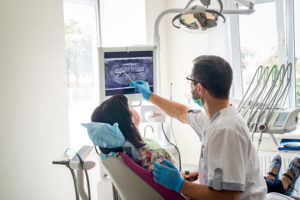Do you ever wonder what qualifications your dentist has? It’s important to understand the extensive classroom and clinical education and licensing your dentist has obtained. Your dentist is the one who performs all the dental procedures and makes a diagnosis that affects your oral cavity. Dentists are responsible to care for your teeth, gums, neck and jaw, salivary glands, and nerves in the head and neck. On average, it takes 8 years after high school for a dentist to complete their education. Let’s take a closer look at what it takes to become a dentist!
Classroom and Clinical Education
After high school, dentists usually attend 4 years of undergraduate study for a bachelor’s degree. However, there are those who do not finish a bachelor’s degree first, or those who complete a combined bachelor’s and doctoral degree program taking less time to finish their schooling. Undergraduate study includes courses in biology, inorganic and organic chemistry, physics, and biochemistry. Applying for dental school after college requires a successful completion of the Dental Admissions Test (DAT). Dental schools look for applicants with high scores on the DAT. The DAT consist of four multiple-choice parts: survey of natural sciences, perceptual ability, reading comprehension, and quantitative reasoning. Most students interested in dental school take the DAT after their third year of college.
Dentists receive their dental training in graduate school, typically through a Doctor of Dental Surgery (DDS) or Doctor of Dental Medicine (DMD) program. DDS and DMD programs have courses in topics such as dental anatomy, physiology, pathology, molecular biology, oral microbiology, neurology, radiology, pharmacology, and dental anesthesiology. Students are educated on different areas of dental practice like periodontics, orthodontics, endodontics, geriatric and pediatric dentistry, prosthodontics, and oral surgery.
Throughout the DDS and DMD programs, dental students complete clinical clerkships and rotations. This allows them to shadow dentists and work with actual patients implementing their learning into practice.
Licensing
Dentists must graduate from a DDS or DMD program accredited by the American Dental Association Commission on Dental Accreditation. They will have to also pass a written and clinical exam to be licensed to practice in the state they reside. The written examination is required, but the clinical portion of the exam requirement varies by each state.
Additional Training and Certification
Dentists may also pursue additional training by completing residencies and other postdoctoral education. Those who want to continue providing general dentistry care can learn about advanced topics in that field. Some may become certified in a dental specialty. The American Dental Association recognizes nine dental specialties: dental public health, endodontics, oral and maxillofacial pathology, oral and maxillofacial radiology, oral and maxillofacial surgery, orthodontics and dentofacial orthopedics, pediatric dentistry, periodontics, and prosthodontics. Each specialty has its own board that certifies dentists who meets education, training, and additional examination requirements.
If you’d like to schedule an appointment with your qualified dentist at California Dental Group, call 800-407-0161.


